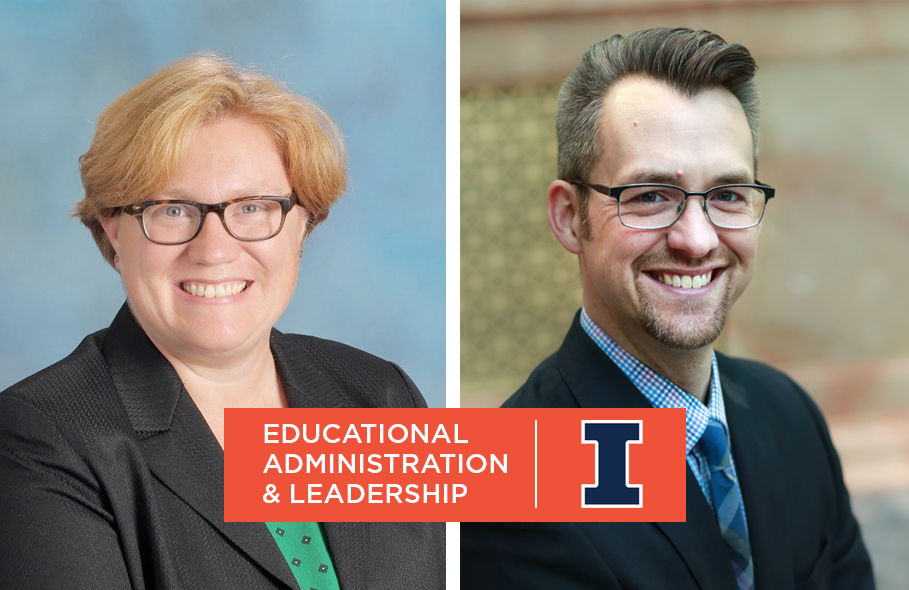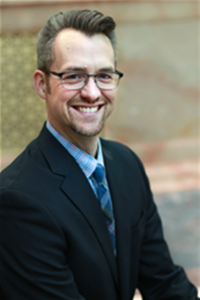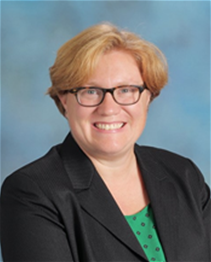Creating Leaders in Education: EAL Degree Programs
by Tom Hanlon / Feb 13, 2019

Lauren May and Patrick Baker enrolled in the Educational Administration & Leadership Ed.D. program at the University of Illinois to better themselves, continue learning, and open doors to greater opportunities.
For both Lauren May and Patrick Baker, returning to the University of Illinois to work on their Ed.D. in Educational Administration & Leadership was an easy choice.
Both received their master’s in educational administration from Illinois, along with their Type 75 administrative certification. (May also earned a bachelor’s degree from Illinois.) Both had excellent experiences in their master’s programs. And both are driven to learn, to improve, and to create opportunities for themselves.
“Part of my motivation is to always stay learning, keep growing, keep doors open for myself,” says May, who, along with Baker and a dozen or so others in their cohort, are completing their coursework at Oakton Community College in Des Plaines, Illinois.
“I have this obsession with trying to better myself, trying to be the best and bring the best to wherever I am,” says Baker. “I have this constant desire to look for ways I can improve and innovate and make things better.”
The Educational Administration & Leadership (EAL) program is a great way, they both found, to meet their educational goals and propel them forward in their careers.
Program Strengths
 Baker and May each speak of many strengths of the EAL program:
Baker and May each speak of many strengths of the EAL program:
- Rigorous coursework. “The quality of the experience you get in the classroom is excellent,” Baker says. “I thought the coursework would be like it was in my master’s program, but it’s a lot more rigorous.” May adds, “The rigor of the program, with all the professors being up on the latest research, the latest trends, allows me to feel confident that my degree and my credential and, most importantly, my ability to do the job is solid.”
- Top professors. “The professors come up from Champaign to conduct class with us,” says May. “You can’t beat having top-level professors who are driving up to Des Plaines to meet with us.” Says Baker, “The professors are topnotch in leading the discussions and choosing high-quality materials for us to examine and giving us really meaningful experiences and assignments. And the discussions they lead are so enriching, because we’ve got people in our cohort who are in different chair positions or who are principals or assistant superintendents.”
- Growth mindset. “The program definitely impacts your mindset,” Baker says. “We talk about a growth mindset in education right now. The program impacts my mindset in how I approach my work—from a more rigorous perspective, a growth perspective, a more thoughtful perspective, a research-based perspective. No matter what I do next, I feel like I’m going to be more successful as a result of how I’ve changed and what I’ve learned through this program.”
- Cohort involvement. “I found the cohort model to be very beneficial,” says May. “The people in my cohort are part of my professional network now.” Adds Baker about pursuing his doctorate, “It’s been a longer journey, and when you’re on a longer journey with other people, there are some intangibles, some benefits that you get along the way.” There are tangible benefits, too: He mentions the value of having discussions with a roomful of practicing administrators. “But I think sometimes the intangibles offer the greatest takeaways,” he says.
- Internship experience. May speaks of the varied experiences she is undertaking in her internship at Oak Lawn Community High School, where she is working with her superintendent. “You peel back the curtain a bit and experience some things that are not part of your job,” she says. “Those experiences are purposely built in so I can really get a feel for what this job is on a day-to-day basis.” Baker is interning in the District 86 office for Joliet Public Schools. “It’s been great to connect with people I cross paths with anyway in a more intentional way to learn the functional and operational side of it at the highest level,” he says. “I’ve been able to pick people’s brains, be involved, and observe some things that have been beneficial to me in taking back to my own job.”
- University of Illinois brand. “Just knowing that the University of Illinois degree means something to people, that I will again have that on my resume, is part of it, too,” May says.
It’s Worth the Sacrifice
Working on an Ed.D. while being employed full-time and having additional responsibilities to meet has been a bit of a juggling act for both Baker and May.
“It’s about managing your time, being organized, just as with any experience,” says May.“It’s been hard work, and a lot of sacrifice sometimes in terms of family time or sleep, but it’s been a wonderful professional experience and I’ve enjoyed it.”
“I’ve burned a few vacation days focusing on assignments,” says Baker. “But doing a program like this, if you have even an inkling of wanting to continue as a practicing educator, the time commitment is worth it. The value far outweighs the sacrifice.”
May says the EAL program has pushed her to be better, to know the current research in her field from all angles in an in-depth way.
“It’s a strong program,” she says. “I know you can never be truly prepared for a new job, but I feel very confident that, as result of this program, I have the knowledge and skills to be able to move into a superintendency.”
Think a degree in Educational Administration & Leadership could be in your future? Email our staff at gradservices@education.illinois.edu to start the conversation.